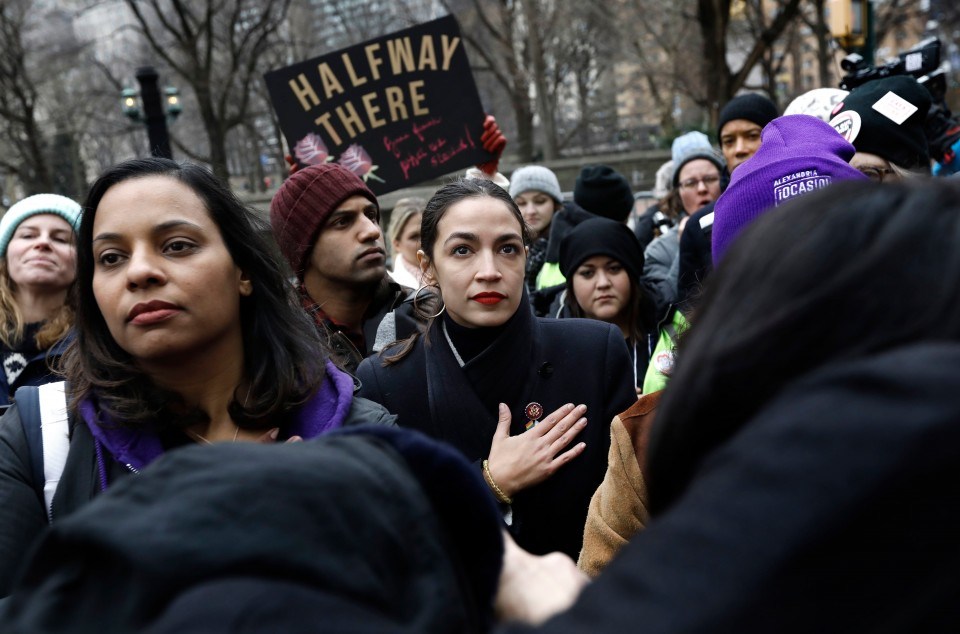Nathan Gardels is the editor-in-chief of Noema Magazine. He is also the co-founder of and a senior adviser to the Berggruen Institute.
The economic elites gathered in Davos this week may not yet be shaking in their snow boots, but the more prescient among them see a political storm coming their way — a revolt against the rich across Western democracies.
Just look around at what is happening down the mountain. In France, Emmanuel Macron, stuck with the moniker “president of the rich,” is besieged by a popular revolt over inequality. In Italy last week, the government approved the “citizen’s income” scheme that will give the poorest up to 780 euros (nearly $900) a month. And in the United States, polls show that 59 percent of voters agree with the just-elected 29-year-old Rep. Alexandria Ocasio-Cortez (D-N.Y.)’s proposal for a 70 percent marginal tax rate on the richest.
In Davos, the chief investment officer of Guggenheim Partners said he thinks “the likelihood that a 70 percent tax rate, or something like that, becomes policy is actually very real.” Ray Dalio, one of the wealthiest investors in the world, also sees such ideas gaining serious traction.
Ocasio-Cortez is the most refreshing face on the American political scene today. Her social media skills reveal all the participatory potential of new technologies, transparently linking legislators with the public even as they wheel and deal in the staid halls of Congress. But her tax proposal has not caught up with the economic implications of the very tools she so deftly deploys. In a way, she is not radical enough.
Like the yellow vest protesters in France and the Five Star Movement in Italy, Ocasio-Cortez asks the right question, but her answer is inadequate and outdated. In a period of inequality comparable to the 1920s, her moral sentiments are well placed. The stiff top marginal rate she proposes is, after all, akin to levels during America’s peak economic growth and the heyday of the middle class from the 1950s to the 1970s.
Yet, we no longer dwell in that stable industrial era of lifelong employment in labor-intensive mass manufacturing enterprises that faced few global competitors. The era we have already entered is far different. It is characterized by a perpetually disrupted economy in which technological innovation, from basic robotic automation to artificial intelligence, is divorcing employment from productivity growth and wealth creation.
The paradox that progressives like Ocasio-Cortez need to face is that the more dynamic this new economy becomes, the stronger a redefined social contract must be to cope with the gaps in wealth and power that are emerging. Fixating on the idea of redistributing wealth through the state after it is already created is not only old hat, but in and of itself will not significantly close the social chasm as it did in earlier times. Progressives should instead focus on enhancing assets of the less well-off in the first instance instead of trying to heal inequality by focusing on redistributing the wealth of others with better opportunities after the fact.
Since income through employment will diminish and perhaps even largely disappear where tasks are routinized, more of people’s incomes in the decades ahead should be drawn from an ownership stake in the robots and systems that displace them. All working-age citizens should hold an equity share in the growing wealth of companies where intelligent machines drive productivity gains. One way this can be done is through national savings accounts, in which all can participate, that are invested in mutual-fund type instruments mixed with diversified venture capital pools.
Some, like former Greek finance minister Yanis Varoufakis, go further. He proposes a “dividend” for all citizens, established by providing them with a share of initial public offerings in the stock market, especially from companies that commercialize publicly funded research and development. And there are many other ways to supplement such schemes. One can envision, to take but one example, a distributed share in ownership of self-driving Uber-like services for residents of the communities where they operate, self-administered through blockchain technology. Everyone online should also be compensated with royalty payments by the large information conglomerates that use their personal data.
If the greatest social fracture is between those who own capital and those who have to live off labor alone, then the answer to inequality is augmenting the capital of those who have gotten the short end of the stick. That suggests the primary policy response to inequality in the future economy should be fostering “universal basic capital” instead of a relying mostly on transfer payments of redistributed wealth. Increasingly, a return on capital ought to supplant sole dependence on wages and salaries. In short, the best way to deal with inequality is to spread the equity around. Instead of paying exorbitant taxes to fund the income of others, everyone would, in effect, be paying themselves.
This is a far deeper response to the challenges ahead than “universal basic income,” an idea many on the left embrace. As a redistributive program, it only perpetuates the structure of inequality instead of breaking it down. And it is wildly expensive.
It is an irony that the skyrocketing growth in wealth of the top one percent since the financial crash in 2008 has opened the door for the likes of the French protestors and Ocasio-Cortez to be taken seriously in the mainstream. In Italy, they already are the mainstream. This political opportunity should not be squandered by promoting exhausted ideological remedies that don’t fit the new realities.
This was produced by The WorldPost, a partnership of the Berggruen Institute and The Washington Post.





